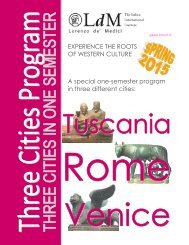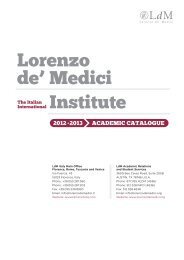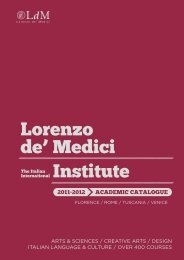aCademiC Catalog 2013-2014 - Lorenzo de Medici
aCademiC Catalog 2013-2014 - Lorenzo de Medici
aCademiC Catalog 2013-2014 - Lorenzo de Medici
You also want an ePaper? Increase the reach of your titles
YUMPU automatically turns print PDFs into web optimized ePapers that Google loves.
FLORENCE<br />
School of Arts & Sciences<br />
Political Science and<br />
International Studies<br />
Introduction to Political Science<br />
POL 150 F<br />
Cr: 3; Contact hrs: 45<br />
This course will introduce you to the formal study of politics. You<br />
will become familiar with the basic vocabulary of the discipline,<br />
learn about the different ways that political issues are studied<br />
and <strong>de</strong>velop critical reading and thinking. Furthermore, this<br />
course will <strong>de</strong>fine basic concepts such as politics, government,<br />
nation, state, types of political systems and <strong>de</strong>velopment of<br />
political institutions.<br />
Globalization and its Consequences<br />
POL 250 F<br />
Cr: 3; Contact hrs: 45<br />
“Globalization” has been a very popular term in recent years.<br />
Technological change, business strategies, cultural interactions<br />
and other aspects of human activity are occurring more and<br />
more on a planetary scale. The course aims at providing<br />
stu<strong>de</strong>nts with a basic un<strong>de</strong>rstanding of the complexity of the<br />
phenomenon, by taking a historical approach covering the<br />
entire 20th century, and then focusing on the most recent<br />
political, social and economic processes of the late 20th and<br />
early 21st centuries. The course starts by <strong>de</strong>fining the concept<br />
of globalization and then offers a brief but clear reconstruction<br />
of the trends towards globalization in previous phases of human<br />
history. It will then focus on specific questions: is economic<br />
globalization an inevitable phenomenon or, rather, a reversible<br />
one? Is economic globalization necessarily tied to western<br />
capitalism? Has globalization taken in the past, and could it take<br />
in the present, other forms than the laissez-faire capitalist one?<br />
What are the origins and the present role of global institutions<br />
such as the IMF and the World Bank? What role is played by<br />
nation states? The conclusive part of the course will address<br />
specific issues that have been the subject of heavy <strong>de</strong>bate in<br />
recent times, such as the “global protests” of the late 1990s,<br />
the relationship between globalization and poverty and that<br />
between globalization and global warming.<br />
From Plato to Machiavelli: Classical Political<br />
Thought<br />
POL 260 F; Dual listed: PHR 260 F<br />
Cr: 3; Contact hrs: 45<br />
The course examines the evolution of that branch of<br />
philosophical thought that gave birth to the mo<strong>de</strong>rn concept of<br />
political science and political thinking, exploring major periods<br />
and personalities in the <strong>de</strong>velopment of political thought. It<br />
thus covers a very long historical period from the time of the<br />
“dawn” of Western philosophy to the most relevant issues of<br />
the mo<strong>de</strong>rn era. Emphasis will be placed first on the Gol<strong>de</strong>n<br />
Age of Greek-Athenian <strong>de</strong>mocracy, through the analysis of<br />
thinkers such as Plato and Aristotle; then, the course will move<br />
on to the main philosophical schools of the Middle Ages (the<br />
Scholastics) through the analysis of authors such as Thomas<br />
Aquinas, Dante and Ockham. Stu<strong>de</strong>nts will then encounter<br />
the extraordinarily rich period of the Italian and European<br />
Renaissance, both as a vast cultural revolution and as a cradle<br />
of new i<strong>de</strong>as and thought systems: the personalities and works<br />
of Thomas More, Machiavelli and Erasmus will be carefully<br />
studied, without un<strong>de</strong>restimating the importance of the rising<br />
i<strong>de</strong>as of Luther and Calvin. Finally, the course will investigate<br />
the early mo<strong>de</strong>rn adaptations of these thought systems as<br />
manifested in the rationalism of Hobbes.<br />
Prerequisites: PHR 130 Western Philosophy, or POL 150<br />
Introduction to Political Science, or equivalents, or sophomore<br />
standing<br />
From Machiavelli to the present: Mo<strong>de</strong>rn<br />
Political Thought<br />
POL 265 F; Dual listed: PHR 265 F<br />
Cr: 3; Contact hrs: 45<br />
This course will analyze some landmarks of the western<br />
philosophical tradition. Its aim is to discuss concisely the views<br />
of some major Western political thinkers in or<strong>de</strong>r to <strong>de</strong>monstrate<br />
how their i<strong>de</strong>as about politics and society are critical to<br />
un<strong>de</strong>rstanding the politics of our time. The course aims to<br />
analyze on the one hand the philosophies and i<strong>de</strong>as that have<br />
been sustaining our present world view, and on the other hand<br />
the roots of some recurrent key themes in these philosophies,<br />
such as the i<strong>de</strong>a of utopia, as well as the anti-utopian vision<br />
whose originator can be consi<strong>de</strong>red Niccolò Machiavelli. This<br />
last theme thus introduces stu<strong>de</strong>nts to the reaction against<br />
the so-called ‘Platonic i<strong>de</strong>al’ that has taken place during the<br />
twentieth century. The concept of totalitarianism is related to<br />
these pivotal philosophical perspectives and this concept will<br />
also be studied with particular attention. More specifically,<br />
special emphasis will be placed on the analysis of a series of<br />
concepts connected to one another, including the concept<br />
of liberty; relativism versus pluralism; freedom, equality and<br />
fraternity. The course is structured as a chronological analysis<br />
of the most important periods and personalities in the evolution<br />
of political philosophy with special attention to the Age of<br />
Enlightenment and Romanticism.<br />
Prerequisites: PHR 130 Western Philosophy, or POL 150<br />
Introduction to Political Science, or equivalents, or sophomore<br />
standing<br />
Human Rights<br />
POL 270 F<br />
Cr: 3; Contact hrs: 45<br />
The course provi<strong>de</strong>s a general overview of human rights by<br />
looking at the subject from different disciplines. These inclu<strong>de</strong><br />
law, political and social sciences, history and philosophy, which<br />
have all <strong>de</strong>alt with the “human” and/or the “rights” element of<br />
the concept. The “rights” element had its first comprehensive<br />
elaboration in the UN International Bill of Human Rights. Human<br />
rights have been also <strong>de</strong>veloped at the regional - European,<br />
American, African, and Arab – level. The “human” element<br />
of the concept has been scrutinized by anthropologists and<br />
philosophers, who have discussed the universal character<br />
of the values that un<strong>de</strong>rpin the “rights”, and the issue of<br />
difference in such value systems. In a sociological perspective,<br />
issues of difference and universality have emerged in respect to<br />
the recognition of the specific rights of groups and minorities<br />
<strong>de</strong>fined along racial, ethnic and sexual cleavages. The course<br />
will propose exercises that will put stu<strong>de</strong>nts in the position to<br />
discuss some interesting theoretical aspects of human rights<br />
in relation to concrete cases and events. This practical work is<br />
meant to give stu<strong>de</strong>nts the opportunity to use human rights<br />
documents and concepts to frame and <strong>de</strong>bate controversial<br />
issues in today’s societies and world politics.<br />
Italy and the EU<br />
POL 272 F<br />
Cr: 3; Contact hrs: 45<br />
The relationship between European integration and Italy is<br />
an odd one. Italians are wi<strong>de</strong>ly known as the most convinced<br />
supporters of European integration. On the other hand, the<br />
EC/EU is at times used by Italian politicians to legitimize<br />
their own actions. European constraints were in fact often<br />
recalled in or<strong>de</strong>r to justify otherwise unpopular fiscal and<br />
monetary measures. The EC began to be perceived as the only<br />
possibility of bringing or<strong>de</strong>r to the national system. Thus, the<br />
<strong>de</strong>mand of supranational structures became also a <strong>de</strong>mand<br />
for repair of the inefficiency of the Italian system. Italy’s nonimplementation<br />
of EC legislation and lack of respect for the<br />
obligations imposed by EC treaties are well known. Even when<br />
EC norms are implemented, this does not mean that they are<br />
necessarily enforced. Is it “a question of culture”, as <strong>de</strong>fined<br />
by The Economist? Now that a new political class has come<br />
to power, will the disintegrative ten<strong>de</strong>ncy of Italy creep back<br />
in, or will the country continue as an unambiguous champion<br />
of integration? Which variables affect the Italian input in the<br />
EU? In or<strong>de</strong>r to better un<strong>de</strong>rstand the Italian integrative and<br />
disintegrative forces toward European integration, the course<br />
is divi<strong>de</strong>d into two parts: in the first part, attention is given to<br />
the Italian system – its origins and how it functions – while in<br />
the second part, the relationship between Italy and the EU - the<br />
main participants and their policies – will be examined.<br />
78<br />
LdM Aca<strong>de</strong>mic <strong>Catalog</strong> <strong>2013</strong>-<strong>2014</strong>





